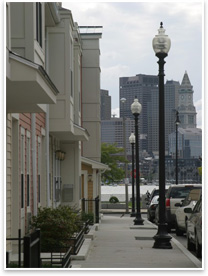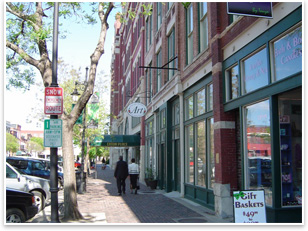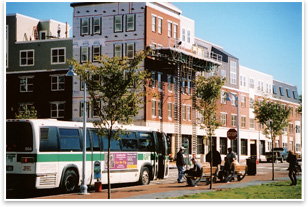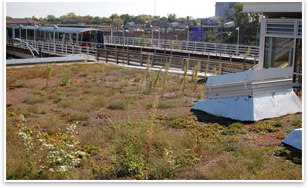|
EPA Lauds Five Smart Growth Projects
by Tracy Ostroff
Associate Editor
Summary: The
U.S. Environmental Protection Agency awarded its 2006 National Awards
for Smart Growth Achievement to five programs that use smart
growth principles to improve existing communities or build new
communities that expand economic development opportunities, enhance
quality of life, and preserve the natural environment. The agency
awarded the projects in the categories of Overall Excellence, Built
Projects, Policies and Regulations, Equitable Development, and Small
Communities.
 Overall
Excellence Overall
Excellence
Massachusetts Office of Commonwealth Development
The Office for Commonwealth Development (OCD) success demonstrates that states
can play a leadership role on development issues while leaving decisions in
the hands of local communities. OCD brings together state agencies responsible
for environmental, transportation, and housing policies in a single office
to promote growth that meets a wide range of goals. Through incentives and
outreach, OCD is changing the way both state and localities make growth decisions.
Production of multi-family housing units, crucial in a state with the nation’s
third least-affordable housing market, has grown from 3,800 to more than 7,000
units annually. State support for transit-oriented development will result
in 37 million square feet of new development near transit stations, relieving
growth pressure in greenfields. OCD has also helped protect about 35,000 acres
of land.
 Built
Projects Built
Projects
Old Town Wichita
Wichita faced significant challenges in reviving its 40-acre old warehouse
district. Banks, fearful of being held liable for groundwater cleanup, stopped
real estate loans in the contaminated area. To stimulate redevelopment, the
city took the lead in cleaning up the site, relieving property owners of the
responsibility. Through the MarketPlace partnership, the city leveraged public
funds to encourage private investment for redevelopment, adding more than 690,000
square feet of retail and office space, rehabilitating eight historic buildings
for residential use, and seeding over $111 million in private investment. Old
Town’s stores, recreational amenities, and many affordable homes capitalize
on its walkable design, mix of uses, and historic beauty. And now the groundwater
treatment system doubles as an educational center on environmental stewardship.
 Policies
and Regulations Policies
and Regulations
Pennsylvania Fresh Food Financing Initiative,
Pennsylvania Department of Community and Economic Development
The Pennsylvania Fresh Food Financing Initiative (FFFI), a public-private partnership,
has provided more than $7.3 million in grants and loans to help supermarkets
locate in underserved communities. The program lets people shop for nutritious
food in their neighborhoods, cutting consumers’ vehicular trips, reducing
transportation costs, and bringing economic development to lower-income communities.
FFFI is designed to complement revitalization efforts in existing communities,
a key smart growth principle. For example, of the 22 supermarkets receiving
funding from FFFI, 20 will create no new impervious cover because they will
be constructed on existing sites or expand capacity at existing stores.
 Small
Communities Small
Communities
Winooski Downtown Redevelopment Project,
Winooski, Vt.
The Winooski Downtown Redevelopment project revitalized this small town with
new development that respects the city’s character and history. The town
preserved or restored nearly 100 acres of natural habitat, returned vacant
properties to productive use, created neighborhood parks, and built the pedestrian-friendly
RiverWalk. The city, working with a development team that included architecture
firms Arrowstreet and Niles Bolton Associates, reestablished the street grid
and added wider sidewalks and on-street parking. Development includes about
500 new homes, with another 400 units planned; a new transit center; about
300,000 square feet of offices, shops, and restaurants; and several neighborhood
parks and other attractive public gathering places. Encouraged by the success
of the downtown redevelopment, developers are rehabilitating several historic
mill buildings along Main Street.
 Equitable
Development Equitable
Development
Bethel Center, Chicago Department of Planning
and Development
The West Garfield Park neighborhood catalyzed a transit-oriented redevelopment
to prevent the shuttering of its transit station. The development is anchored
by Bethel Center, which provides employment services, child care, and banking
in a “green” building on a former brownfield. Bethel New Life Inc.,
a local faith-based nonprofit organization, working with Farr and Associates
Architects, collaborated with residents, churches, public officials, school
principals, the Garfield Park Conservatory, and local organizations to develop
a two-story, 23,000-square-foot, environmentally friendly facility dubbed “Bethel
Center.” The development incorporates green building technology and features
a green roof, photovoltaic cells, and recycled and non-toxic building materials.
|


 Overall
Excellence
Overall
Excellence  Built
Projects
Built
Projects Policies
and Regulations
Policies
and Regulations Small
Communities
Small
Communities Equitable
Development
Equitable
Development